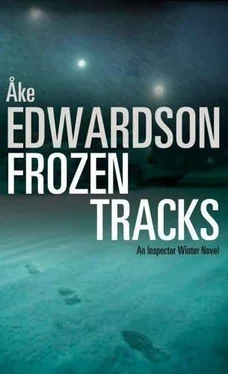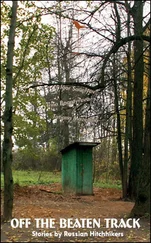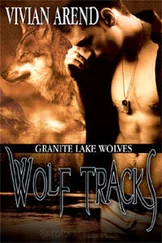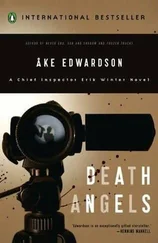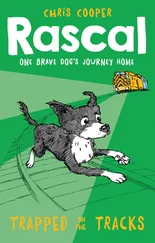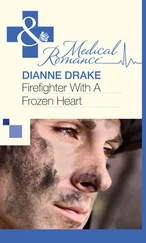You could hold hands. That would do.
He closed his eyes, looked, closed his eyes. Now all the children were there, as if they’d been given an order by the ladies who were standing like soldiers. He smiled. Like soldiers!
They were looking in his direction, straight into the camera that they couldn’t see. Nobody could see it or him. He’d left his car and stood hidden, just as everything else had disappeared into itself among the bushes and woods and trees. Grass. Stones, rocks, everything else there. Soil.
The children set off walking, in a long line. He followed them. Here at home on the sofa he could see how his hand was shaking as he emerged from the bushes; a branch came swooping toward the lens.
They were in the street. He was in the street. He was a long way away from them, but this was a good camera. One of the supervisors turned around and looked at it.
He leaned forward. She was still looking at the camera. He had zoomed in a bit closer. She turned away. She turned back again.
Buildings in the picture now. Uninteresting buildings that simply grew and grew upward and sideways. Cars in front of the picture, making it blurry.
He had turned the camera away to avoid that stare. It wasn’t her staring he wanted. Why was she there?
The buildings had gone now. He was somewhere else. He knew where. There were rocks behind the house. The girl was on a swing. Somebody was standing behind her. The girl swung higher and higher. He followed her up and down, up and down.
He sat there, following her with his head. The swing, the girl, the hands pushing from behind the girl. It looked to funny.
Somewhere else. A family, and he’d followed them until they grew smaller and smaller and no zoom in the world could have helped anymore.
***
Hours later, who could say how many. He drove past all the familiar places. Everything was the same as usual, but the light was brighter and dazzled him, must have dazzled others as well. Fir trees as if the forest had come walking to the roadside and left a deserted plain behind them. Then, when it’s all over, there will be no forest left anywhere at all. Only the fields where you couldn’t escape. Nowhere to hide.
There’s that park, and here’s this one. He knew them all so well. Everything was familiar.
“I’d like a monthly ticket, please.”
A woman sticking her face into his cab as if she wanted to squeeze her fat body through the opening and force him out through the window on the other side. That wouldn’t surprise him. They’re all the same. Pressing, forcing their big fat bodies against me, pressing up against me, their big fat bodies.
“Don’t you have monthly tickets onboard?” she asked.
“Er, yes, that’ll be 120 kronor please.”
“A hundred and twenty? They only cost a hundred at the newsstand.”
Buy one there, then, get out of here and buy a ticket there. At the newsstand. He didn’t want her here, in his streetcar. She was pressing. A man behind her was pressing. They wanted to get into here, into his cab. They wan-
“Why should I pay 120?”
“Because it costs 120.”
“But why?”
“I have to go now. Do you want a ticket or not? I have to get going now, you stupid bitch.”
“Wh… what did you say?”
“I have to get going now.”
“Wha… what did you call me?”
“I didn’t call you anything. I said I have to take off now because I have to meet a deadline at Söbergsgatan.”
“Söbergsgatan?”
“Söbergsgatan.”
“Söderbergsgatan?”
“Söbergsgatan.”
“Give me that ticket, then. I can’t stand here all day.”
“A hundred and twenty kronor.”
“Here.”
At last he was able to move again. The stupid bitch had disappeared toward the back of the streetcar. He could still smell her perfume. It was enough to make you sick. Imagine if she’s got children. No, no, no.
***
He was just about to get into his car.
“Do you have a second, Jerner?”
It’s already gone, he thought. I had it, but now it’s gone.
He got into the car without answering.
“Jerner?”
What did he want-another second? Here you are, out through the window-now that one’s gone as well.
“Turn the car off for a minute, Jerner. What the hell’s the matter with you? Didn’t you hear that I’d like to have a word with you?”
Have a word. What word would you like? How about asshole?
“If you don’t listen to what I have to say you could find yourself in deep trouble,” said the man who was still there beside the car. Jerner had turned off the engine. But the one who called himself the boss was still there. What did he want? He was babbling on. “The woman called HQ right away on her mobile and they passed the message on to me. She says you called her disgusting names and, well, were acting strange.”
Disgusting names? Whose behavior had really been disgusting?
He drove off, didn’t even bother to glance in the rearview mirror.
WINTER KICKED OFF HIS SHOES AND DROPPED HIS OVERCOAT ON the floor where he stood. Angela was watching.
“Pick it up!” he said, pointing to the coat.
“Not so loud. Elsa’s asleep. She had a stomachache and was being a handful.” Angela looked at the overcoat, then at him. “You don’t have the voice of a bully.”
He headed for the kitchen.
“Are there any leftovers?”
“You’ll have to go sleuthing in the pantry.”
“We don’t have a pantry.”
***
They were sitting at the kitchen table, as usual. Winter was thinking about Smedsberg’s kitchen, not to mention Carlström’s combination: cowshed and kitchenette.
“What was it like out on the flats?”
“Flat.”
“Did that surprise you?”
“Yes, it did, in fact. Sometimes it was like being at sea.”
“There’s an illness you can get out on the prairies,” said Angela. “Simply by living there.”
Winter thought about the men they had met that day.
“That doesn’t surprise me.”
“In the USA they call it ‘the sickness.’ ”
“Not bad. Why can’t all illnesses have nice simple names like that?”
“People go mad in states like Wyoming and Montana. In those enormous prairies there are no reference points. All you can see is a vast flat plain and the horizon.”
“Like being at sea, like I said.”
Angela poured out more tea.
“There’s nothing to look at, no trees, no houses, no roads with cars or buses. People lose their sense of direction. Lose their senses in the end.”
“So all you’d need to stay sane would be an outhouse within sight?” said Winter.
“That would be enough, certainly.”
“The people living where we were today certainly seem odd, but there are a few outhouses scattered around,” said Winter.
“Did you find the boy? The medical student?”
“No. And nobody expected we would.”
“Why did you go there, then?”
He didn’t answer, poured out some more tea, buttered another slice of rye bread, placed a piece of Stilton on it, cut a wedge from his apple.
“Did you just need to get away for a while?” Angela asked.
“Something happened out there,” said Winter.
“What do you mean?”
He took a sip of tea and a bite of his open sandwich. The radio on the countertop was churning out the latest weather forecast: colder, clearer, a chance of snow for Christmas.
“Something happened out there,” Winter said again, sounding serious. “I had a strange feeling in one of the houses we visited.”
“What are you basing that feeling on?”
“The sickness,” he said, grinning over his teacup.
Читать дальше
